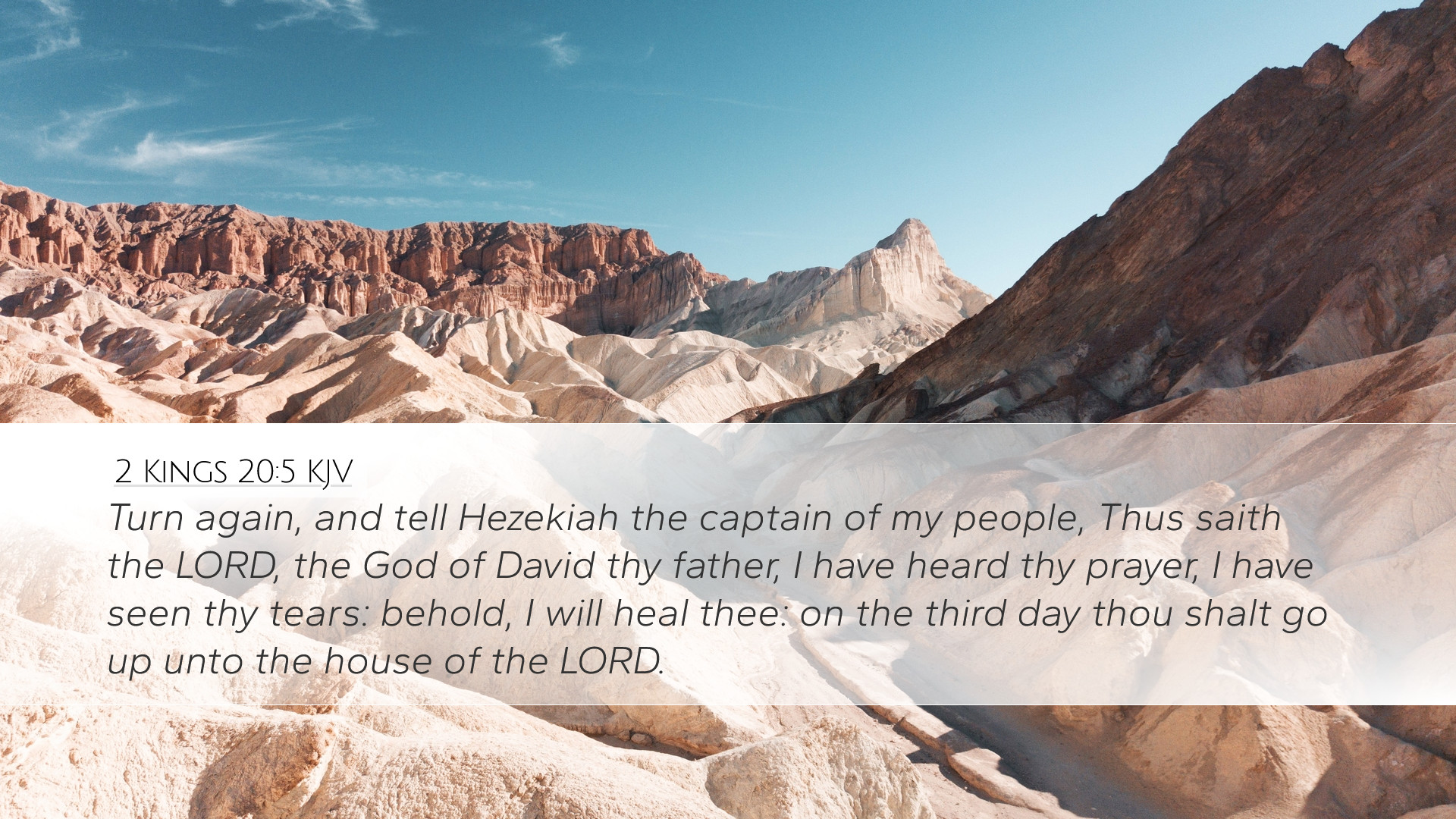Old Testament
Genesis Exodus Leviticus Numbers Deuteronomy Joshua Judges Ruth 1 Samuel 2 Samuel 1 Kings 2 Kings 1 Chronicles 2 Chronicles Ezra Nehemiah Esther Job Psalms Proverbs Ecclesiastes Song of Solomon Isaiah Jeremiah Lamentations Ezekiel Daniel Hosea Joel Amos Obadiah Jonah Micah Nahum Habakkuk Zephaniah Haggai Zechariah Malachi2 Kings 20:5
2 Kings 20:5 KJV
Turn again, and tell Hezekiah the captain of my people, Thus saith the LORD, the God of David thy father, I have heard thy prayer, I have seen thy tears: behold, I will heal thee: on the third day thou shalt go up unto the house of the LORD.
2 Kings 20:5 Bible Commentary
Commentary on 2 Kings 20:5
Verse Context: 2 Kings 20:5 states, "Turn back and tell Hezekiah, the leader of my people, ‘Thus says the LORD, the God of David your father: I have heard your prayer; I have seen your tears; surely I will heal you. On the third day you shall go up to the house of the LORD." This verse captures a pivotal moment in the reign of King Hezekiah, illustrating the themes of divine mercy, answered prayer, and restoration.
Overview of Hezekiah's Reign
The reign of Hezekiah (2 Kings 18-20) is characterized by significant reform and a return to the worship of Yahweh, contrasting sharply with the reigns of other kings of Judah. Hezekiah initiated religious reforms, removed pagan influences, and called for the people to return to proper worship (2 Kings 18:4). His reign included both remarkable achievements and challenges, particularly during the Assyrian siege (2 Kings 18:13-19:37).
Insights from Public Domain Commentaries
Matthew Henry's Commentary
Matthew Henry emphasizes Hezekiah's earnestness in prayer during his illness, showcasing the leader's heart for God and dependence on divine intervention. Henry notes the following key themes in this passage:
- Divine Attention: The verse highlights that God hears prayers and sees the tears of His people. God's awareness of human suffering is both intimate and profound, echoing throughout Scripture.
- Promise of Healing: Henry discusses the assurance of healing given to Hezekiah, demonstrating God's compassion and willingness to restore. This healing is not just physical but spiritual, reinforcing the leader's commitment to Yahweh.
- Encouragement to Worship: The reference to going up to the house of the LORD serves as a reminder of the importance of communal worship in responding to God's grace.
Albert Barnes' Commentary
Albert Barnes provides an analysis that delves into the implications of God's message to Hezekiah. Barnes mentions the significance of the timing of the healing, noting that God's performance of miracles often correlates with His covenant relationship with His people:
- The Timing of Restoration: Barnes points out that God's promise includes a three-day period before going to the temple, which symbolizes preparation and a moment of reflection for both Hezekiah and the nation.
- God's Sovereignty: By emphasizing that the message came from the LORD, Barnes reminds readers of God's control over Hezekiah's fate and the broader geopolitical dynamics of the time.
- Historical Context: The commentary also contextualizes Hezekiah's illness within the larger narrative of Judah's struggle against Assyria, illustrating how personal affliction can take place even amidst national crisis.
Adam Clarke's Commentary
Adam Clarke offers a detailed exploration of the theological implications in 2 Kings 20:5, focusing on the nature of divine mercy:
- The Nature of God's Mercy: Clarke posits that God’s intervention is often predicated on the sincerity of the believer’s heart. Hezekiah’s tears are indicative of genuine remorse and supplication.
- Transformation Through Affliction: Clarke notes that suffering often leads to spiritual awakening and deeper reliance on God, a theme recurrent in Scripture.
- Encouragement for Future Generations: The healing of Hezekiah is portrayed not only as personal redemption but also as a lesson for future generations on the power of prayer and faithfulness to God.
Theological Reflections
This passage encapsulates critical theological notions relevant to pastors and scholars:
- Prayer and Providence: Hezekiah's experience illustrates how prayer intersects with God's providential plan. The acknowledgment of God hearing prayer serves as a foundation for establishing a prayerful lifestyle.
- God’s Faithfulness: The promise of healing affirms God's faithfulness to His covenants, reinforcing the belief that God responds to those who earnestly seek Him.
- The Role of Intercession: Hezekiah's prayer exemplifies intercessory prayer, an important theme in both the Old and New Testaments, reminding leaders of their role in advocating for their communities.
Application for Today's Audience
In contemporary ministry and theological study, 2 Kings 20:5 provides vital lessons:
- Encouragement in Suffering: Believers today can take comfort in the fact that God is attentive to their struggles and sorrows, encouraging a posture of prayerful sincerity.
- God’s Response to our Needs: This passage reassures the faithful that God remains ever-present and responsive to their needs, urging them to seek Him continuously.
- Worship as Response to Grace: Going up to the house of the LORD symbolizes the appropriate response to God’s mercy—an active worship that acknowledges His goodness and provision.


